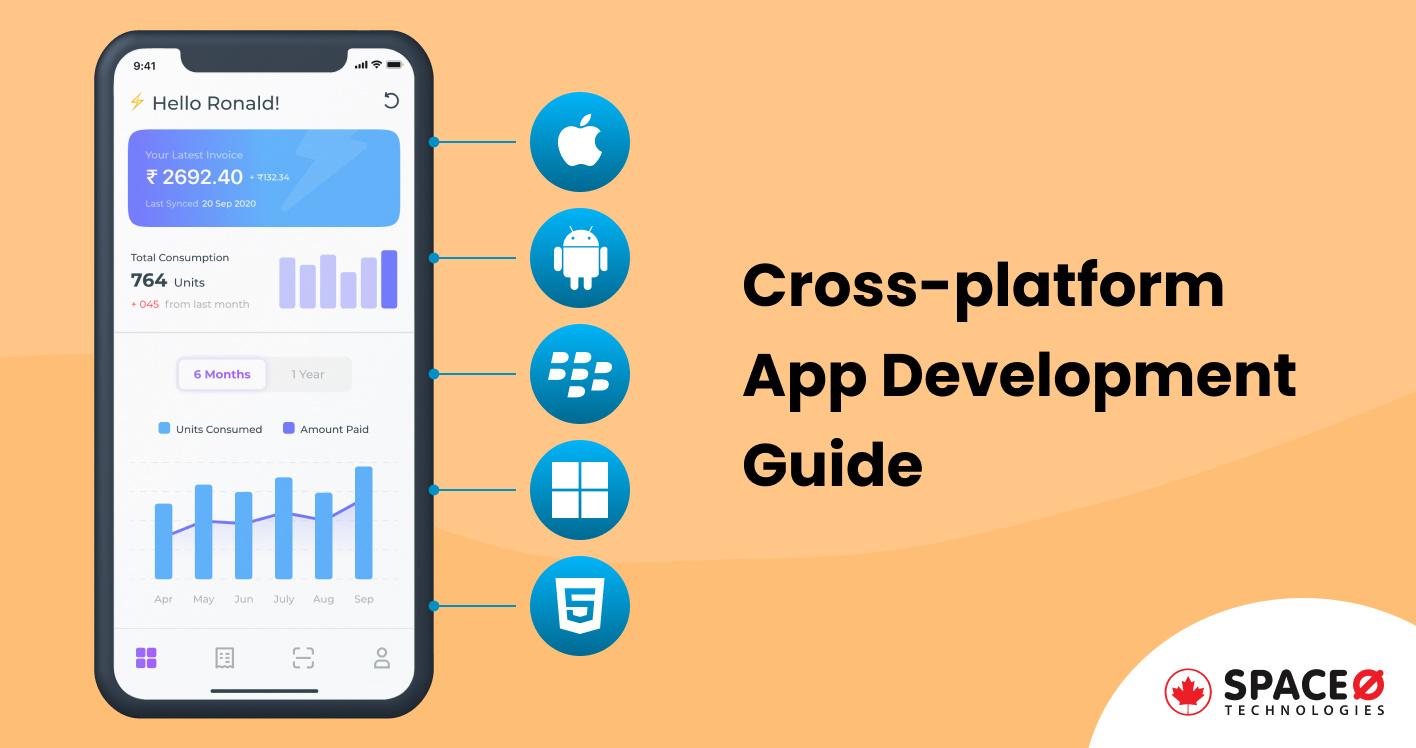
A Complete Guide to Cross Platform Mobile App Development
Read this blog if
- You want to learn what exactly is cross-platform mobile apps, and how is it different from native apps.
- You want to check what are the advantages and disadvantages of having a cross-platform application.
- You want to know which cross-platform tools you need to select for cross platform mobile app development.
According to the fourth annual developer ecosystem survey conducted by JetBrains, 45% of mobile app developers prefer to use cross-platform tools and frameworks because of the reasons like code reusability, quick development, and consistency.

Image Source: JetBrains
Let’s get started.
Table of Contents
What is Cross-platform Mobile App Development?
Cross-platform app development refers to building a single application that runs on multiple operating systems including Android, iOS, and Windows.
Rather than developing different app versions for each platform, developers can build applications that run on a single platform with a single codebase. Since it follows the “write once, run everywhere” philosophy, the development process becomes faster which helps you to deploy the app with reduced time-to-market.
Real-time examples of cross-platform mobile app
- Instagram is built with React Native
- Google Assistant is developed with Flutter
- Alaska Airlines is using Xamarin
Many companies prefer cross-platform app development solutions for various reasons like reducing app cost, scalability, faster release, and consistency. If you want to increase the visibility of your brand, a leading mobile app development company can help to increase your brand’s presence.
Here is a case study of Nubank which states that they used cross-platform frameworks like React Native and Futter for long-term maintenance, to get a consistent look on both the platforms- iOS and Android, to create less dependency on another development team, and so on.
However, the app can even be developed in a native way which means an app is developed using the SDK of a specific operating system (iOS or Android). It takes into account all the device configurations like hardware memory, sensors, and cameras. The advantage of the native apps includes high performance, seamless user experience, and robust functionality.
Want to Develop a Cross-platform Mobile App?
Want to validate your app idea?

Both have their merits and demerits, but what is the difference between native and cross-platform app development?
Let’s quickly check out the major differences.
How is Cross-platform Different from Native Mobile App?
Native apps are different from cross-platform apps. One of the major differences between native and cross-platform is that native apps use a specific app development programming language for a particular operating system.
For instance: Objective-C for iOS and Java and Kotlin for Android.
Let’s understand the other differences.
| Comparison Factor | Native App | Cross-platform App |
|---|---|---|
| UI/UX | The native apps have platform-specific UI as it is developed independently on two different operating system | Cross-platform app Common UI for all apps as it is developed with the same codebase on both the operating system |
| Development Time | The native apps require time as developers need to write different code for different operating systems | Cross-platform apps require less development time as developers have to write single code for all the operating systems |
| Costs | The development cost of a native app is high compared to a cross-platform app | The development cost of the Cross-platform app is low compared to the native app |
| Code Reuse | Code cannot be reused in the native app as Android and iOS both require different code to develop an app | Code can be reused in cross-platform apps as Android and iOS both are developed with the same code |
| Team Size | Different teams for Android and iOS are required to develop the same app on both platforms | Only a team of cross-platform app developers are needed to develop the cross-platform solution |
| Tools | AppCode, XCode, Android Studio are native app development environments of Android and iOS | React Native, Flutter, Xamarin are the frameworks to develop the cross-platform apps |
| Dependency | Native apps are less dependent on other open-source libraries and factors | Cross-platform apps are extensively dependent on different libraries and tools |
However, choosing between a native and cross-platform mobile app completely depends on the current state of your business, requirements, features, and the type of app you want to develop. In some scenarios, cross-platforms outperform native apps and vice-versa.
Let’s understand why most businesses prefer cross-platform mobile apps.
Advantages of Using Cross-platform Apps
Some of the advantages of cross-platform mobile apps are:
Helps to Cut the Expense
In cross-platform app development, a single codebase is required to develop an application. Businesses can get the app working without spending a huge amount on development. A cross-platform requires only one team with fewer members, which cuts down the cost of mobile app development.
With cross-platform app development, getting the initial version ready and seeing how it is performing in the market is much easier. Since cross-platform app development is used only once, the cost of redevelopment on every platform can be avoided.
Less Development Time Due to Code Reusability
Another important advantage of the cross-platform app is that the code can be reused multiple times. Instead of designing new codes for every platform, programmers can develop the same app by reusing the same code for multiple platforms. Reusing the code can eliminate the repetition of tasks, saving time and resources for the company.
Here’s a case study of Instagram who adopted React Native to enable the product team to ship features faster through code sharing and higher iteration speeds. With tools like live reload and hot reload, the company wanted to quickly and easily experiment, build UIs, add features, and fix bugs quickly.
Reach to the Wider Audience
If you develop a native app, you can reach the audience for the specific operating system. But, if you create a cross-platform app, you can reach a wider audience or target both the iOS and Android markets at the same time. With the higher reach, your app has a greater chance to strengthen your market presence, build brand engagement, boost your bottom line, and increase your popularity.
Brand Consistency Between Platforms
Brand consistency ensures that your brand is easily recognizable across all the platforms. With cross-platform app development, creating a consistent brand image can be done with ease as the platform shares the same codebase. You can build coherent identities in apps on both platforms with ease.
Here’s a case study on SouthWest Airlines who developed the Champion app by leveraging the cross-platform framework ionic to provide the same user experience across the different platforms. The company ensured color, type, playful voice, tone, and puns are consistent on multiple platforms to support the brand consistency.
Deployment is faster
Since only a single app is developed, it is easier to maintain and deploy any updates or modifications in the code. The updates can be easily deployed across platforms and devices. Moreover, if there is an error, the universal code for both apps can make it easier to correct.
Disadvantages of Cross-platform Mobile Apps
Glitches in the Performance
Since it uses a single codebase for Android and iOS, it can’t use all the in-built features provided by the native devices like graphics and animation or 3D effects. As a result, sometimes it may fail to integrate with the operating system, which results in performance issues. Moreover, the apps that are built with HTML5 depend on call-back-style programming to communicate with native plugins. This makes the app complicated, which results in slow solutions.
Platform Limitations
Every platform has unique features and functionalities to make an app creative. In cross-platform apps, some of the tools are not available while developing apps on multiple platforms. Moreover, SDKs of native cross-platform are not matured yet, and its GUI needs to be coded each time for a platform-specific look and feel.
Less Flexibility
A smartphone with less hardware configuration is unable to read HTML 5 animation and show the exact GUI. Moreover, browser components also vary from platform to platform. So, it is difficult for cross-platform apps to support the old operating system. To upgrade the app with the latest features, developers need a lot of development work.
You can see how cross-platform mobile development is not all glittery. So, it is up to you to decide whether it is the best approach for your project. However, most popular companies like Pinterest, Walmart, Target found cross-platform development a worthy approach to building a mobile app.
Let’s quickly check out the types of tools you can use to develop cross-platform apps.
Top Cross-platform Development Tools
You might be aware of the different cross-platform tools that help scale your business, but choosing one can be challenging. And selecting the wrong cross-platform framework can mismanage your budget. To make it easier for you, we have made a list of different cross-platform tools based on reviews from G2.
Here is the list of top cross-platform mobile application development tools.
| Sr. No | Name | Ratings From G2 | Language | Key Features | Application Example |
|---|---|---|---|---|---|
| 1 | Flutter | 4.5 stars | Dart |
|
|
| 2 | React Native | 4.5 stars | JavaScript |
|
|
| 3 | Ionic | 4.4 stars | TypeScript |
|
|
| 4 | Xamarin | 4.4 stars | C## |
|
|
| 5 | Apache Cordova | 4.3 stars | HTML5, CSS, JavaScript |
|
|
| 6 | Appcelerator | 4.0 stars | JavaScript |
|
|
Want to know more in-depth about the tools and frameworks? Check out this complete guide about top mobile app development frameworks that can help to save your time, effort, and money.
Useful resource
To select the best framework, a number of factors should be considered, including project-scale, the number of native features, UI complexity, budget, community support, and delivery time.
Until now, you may have an idea about how cross-platform development can help you grow your business.
But it is even essential to know whether your business requires a cross-platform approach or not.
Let’s explore in which scenarios you should use cross-platform apps?
When to Develop a Cross-platform Mobile App?
- If you have a wider audience who use your app on mobile and web
- If you want to develop simple apps to connect with your customers without animations or complex features
- If you want to launch your application on multiple platforms quickly
- If you want to test your idea with an MVP version
- If you have limited resources in time, money, human resources
Convert Your Idea Into a Reality
Talk to us. Validate your idea for free. Get a custom free quote, e-specially created for your project.
FAQ About Cross-platform App Development
From where to hire cross-platform mobile app developers?
To identify cross-platform mobile app development services providing company, here’s the list.
- Space-O Canada
- Toptal
- Upwork
- Clutch
- GoodFirms
How much does it cost to develop a cross-platform mobile app?
The overall cost of cross-platform development ranges from $15,000 to $25,000. However, it is just an average estimation of the app development cost. It varies as per the business needs, features, flexibility, and complexity of the app. So, to determine the exact cost of the application, you need to discuss your business requirements with us.
Ready to Start with Cross-platform Mobile Development?
We have summarized the complete guide to developing the mobile app with a cross-platform approach. We hope all the information about the development helps you to make the right decision. If you want to kick-start with app development, you can hire a freelancer or the mobile app developers, or a mobile app development team from a leading company like Space-O who has expertise in custom cross-platform mobile app development solutions.
The developers of Space-O Canada have delivered more than 100 web portals across the globe for different industry verticals. Get in touch with us through the contact us form, and one of our sales representatives will get back to you shortly.

Want to develop a cross-platform mobile app?
Editor's Choice

Top Software Development Technologies for Your Business

Comprehensive Guide to Payment Processing Software in Canada for 2025

10 Key Benefits of Custom Software Development for Modern Businesses
All our projects are secured by NDA
100% Secure. Zero Spam
*All your data will remain strictly confidential.
Trusted by


Bashar Anabtawi
Canada
“I was mostly happy with the high level of experience and professionalism of the various teams that worked on my project. Not only they clearly understood my exact technical requirements but even suggested better ways in doing them. The Communication tools that were used were excellent and easy. And finally and most importantly, the interaction, follow up and support from the top management was great. Space-O not delivered a high quality product but exceeded my expectations! I would definitely hire them again for future jobs!”

Canada Office
2 County Court Blvd., Suite 400,
Brampton, Ontario L6W 3W8
Phone: +1 (437) 488-7337
Email: sales@spaceo.ca

